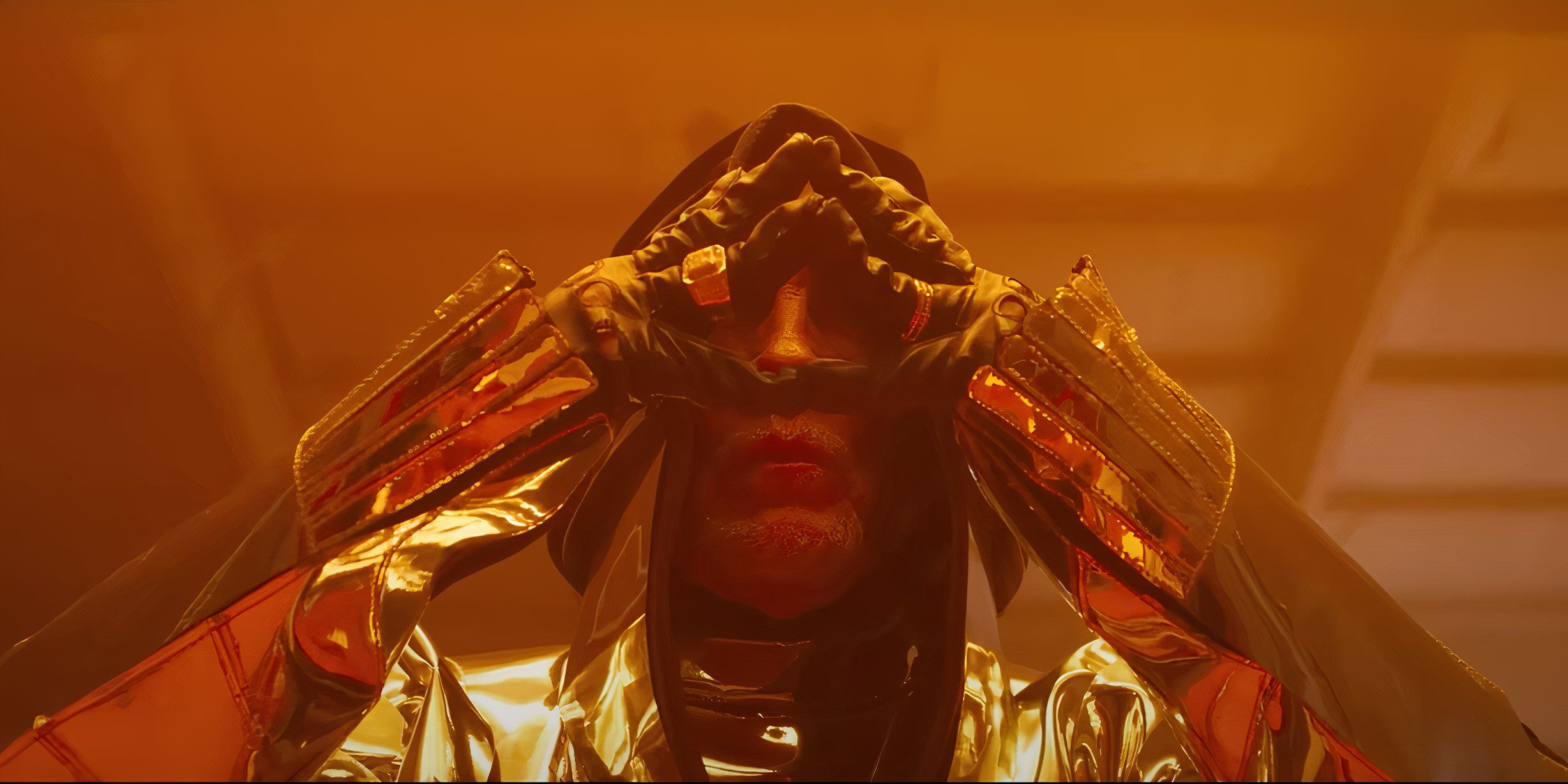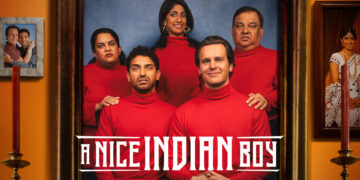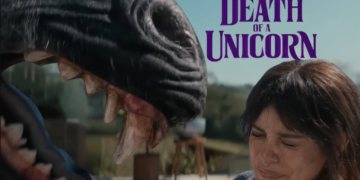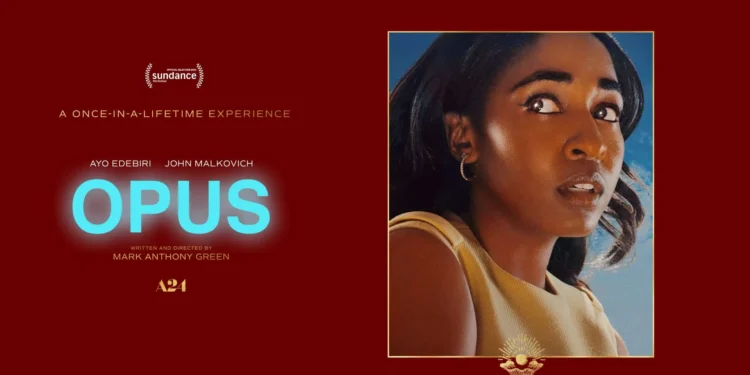Modern horror has seen a growing trend of films exploring celebrity worship and fan culture. With A24 at the helm, a psychological thriller, and Ayo Edebiri in the mix, Opus sounds like an instant classic, right? Written and directed by Mark Anthony Green in his feature debut, the film sets high expectations, especially with a cast that suggests it’s destined for greatness.

After three decades of absence, ’90s pop icon Alfred Moretti (John Malkovich) emerges from retirement to announce his highly anticipated 18th studio album, “Caesar’s Request”, igniting a media frenzy. Despite his indefinite hiatus, his devoted fanbase has remained unwavering, eagerly awaiting the day of his return. The moment the news broke, fans camped out in their cars for even the briefest glimpse of the legendary artist. Moretti’s comeback isn’t just a nostalgic revival, it’s a multigenerational event, uniting longtime admirers with a new era of listeners, as parents who once cherished his music now pass their admiration down to their children, who are poised to experience what is being hailed as the album of the century.
![A24 Horror Movie 'Opus' Stars John Malkovich as a Popstar Cult Leader [Image] - Bloody Disgusting](https://i0.wp.com/bloody-disgusting.com/wp-content/uploads/2025/01/opus.jpg?fit=980%2C410&ssl=1)
Moretti assembles an eclectic group of six media figures for an exclusive listening party at his secluded Utah compound: aspiring journalist Ariel Ecton (Ayo Edebiri), whose hunger for recognition outweighs her experience; her egotistical and self-important boss, Stan (Murray Bartlett); high-maintenance talk show host, Clara Armstrong (Juliette Lewis); relentless paparazza Bianca (Melissa Chambers); social media influencer, Emily Katz (Stephanie Suganami); and controversial radio shock jock, Bill Lotto (Mark Sivertsen). Together, they embody the very institutions that both worship and dismantle celebrity culture, creating an inherent tension that simmers beneath the film’s surface.
This carefully curated audience is granted the rare privilege of being the first to hear “Caesar’s Request,” a comeback album framed as nothing short of a cultural event. But beyond the spectacle, their presence speaks volumes—the starving artist, the self-indulgent industry figures, and the influencer, the modern embodiment of manufactured relevance. The film cleverly interrogates how each of them reacts to this moment, as though receiving a divine gift, reserved only for those deemed worthy.

The narrative unfolds primarily through Ariel’s perspective. As a young journalist, she is desperate to establish herself yet lacks the wisdom that only experience can provide. The film subtly critiques the nature of credibility, how lived experience shapes perspective, and how authority in storytelling is not merely claimed, but earned.
Nestled deep within the desolate expanse of the desert, the community, perhaps more accurately, the cult, exists in complete seclusion from the outside world. It predates Moretti’s arrival; he is merely a devoted disciple who has since molded it into its present form. At his side are the Levelists or Believers, the unwavering followers who don identical dark navy-blue attire as a symbol of unity. Each guest is assigned a personal concierge from among them, reinforcing the illusion of hospitality. Naturally, the compound is a strict no-technology zone an environment that, for an influencer, might as well be purgatory.
The experience is structured around a meticulously curated itinerary, an initiation of sorts into the community’s way of life. Moretti’s vision is clear: to establish a self-sustaining society, a cult disguised as a functional village where members engage in communal tasks, arts and crafts, cooking and cleaning, teaching and learning all under the guise of civilization. Yet, through Ariel’s eyes, the utopian façade unravels, revealing something far more insidious. She begins to challenge the morality of this place, questioning Moretti directly: “This place, this religion, Level… All religions do something. Catholics go to mass, Muslims pray toward Mecca. What do you call a group that does nothing together? Congress.”

At the heart of Moretti’s ideology is the belief that unison is the key to freedom. True power, he suggests, lies in molding the masses into obedient followers, shepherded like livestock. “Teach them young, and the world will be yours,” he proclaims, laying the foundation for future generations to inherit his vision. Yet, what unsettles Ariel most is that this is not a collective of ordinary, disillusioned individuals seeking purpose, it is a carefully selected assembly of society’s most gifted minds. “The people here are insanely talented,” she observes, “and weirdly happy.” A chilling realization sets in: this is not just a cult, it is a meticulously engineered experiment in control.
This semi-autobiographical film draws from director Mark Anthony Green’s own experience as an editor for GQ, offering a sharp commentary on the increasingly blurred lines between traditional journalism and social media influence. In an era where both industries compete for relevance, the film poses an essential question: whose work holds more weight, and how do their responsibilities overlap or diverge? The film’s answer is blunt: “If social media wants to freak out about every rumor, so be it. But you guys are journalists.”

At the core of Opus lies an unspoken yet undeniable formula for journalistic success, a three-step blueprint that encapsulates the state of entertainment media. Step one: Write about famous people, because they are inherently fascinating. Step two: As a result, people will begin to find you fascinating for writing about them. Step three: Leverage that attention to publish whatever you want, whether it’s about love, hate, or personal musings, simply to prove you’re a great writer. Ariel follows this exact trajectory, a reflection of the modern entertainment landscape, where notoriety begets credibility, and storytelling often becomes secondary to spectacle.
Opus weaves a compelling critique of worship and idol culture, dissecting the eerie devotion that transforms celebrities into near-deities. Moretti is not just a star—he is the star, a god with a capital G, revered by those who project their deepest desires onto him. The film lays bare the unsettling truth of celebrity obsession, where fans form parasocial relationships with figures they perceive as untouchable, otherworldly beings. As the film so sharply puts it, “Nobody is more of a star fucker than the fucking star.”
One of the film’s most haunting takeaways lingers long after the credits roll: “With talent comes forgiveness. The bigger the talent, the more complete the forgiveness.” It is a chilling reminder of how society grants unchecked power to those it deems extraordinary. “There’s no cult like celebrity,” the film’s tagline declares, and Opus proves just how terrifyingly true that is.
Through flashbacks to Moretti’s concerts, we witness this adoration in its rawest form audiences locked in a hypnotic trance, their eyes glistening with near-religious fervor. This same phenomenon manifests at the listening party, reinforcing the film’s thesis: idolatry is not reserved for stadiums, it exists wherever admiration tips into worship. Opus masterfully examines the fine line between appreciation and over-idolization, questioning when admiration for an artist’s work mutates into something far more insidious.

The cast of Opus is undoubtedly one of its greatest strengths, with Ayo Edebiri leading the charge. Her ability to seamlessly blend comedic charm with grounded dramatic moments makes her an incredibly compelling presence on screen. The cinematography and musical score also stand out, with the soundtrack designed to entrance and unsettle, adding a hypnotic layer to the film’s quirky vibe. As a musical horror piece from A24, the film’s distinct atmosphere is further heightened by John Malkovich’s surprising vocal performance as Moretti, showcasing his talent as a “pop star” in this fictional world. Visually, the film is striking, with set and costume design featuring muted tones of cream, olive, and white, especially in Ariel’s outfits. The warm lighting, infused with oranges and yellows, gives the film a comforting glow, juxtaposed against the darker undertones of the story.
However, where Opus falters is in its execution. Green, while ambitious, attempts to juggle numerous ideas, but the film feels a bit overstuffed. Despite its strong concepts, there isn’t enough time to fully explore or realize them. The film could have benefited from an extended runtime, perhaps an additional hour, to allow these ideas to breathe and develop more fully.
In a landscape filled with sharp satirical social horrors like Get Out, Midsommar, The Menu, and Blink Twice, Opus doesn’t quite carve out enough of its own identity, leaving it feeling like a familiar echo rather than a fresh, lasting experience. To its credit, Opus dares to wade into the murky waters of celebrity, media, and devotion, crafting an experience that is as unsettling as it is thought-provoking. While it doesn’t fully stick the landing, it lingers in the mind, much like an eerie melody you can’t shake, haunting, hypnotic, and impossible to ignore.



























